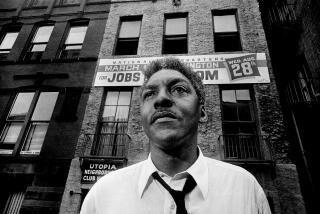Sermon : The Reward of Compassion Is a Feeling of Rightness
- Share via
The other day, a friend’s parked car was totaled. Coming back from an errand, she saw that the street where she had parked was blocked off by police, a police helicopter was circling overhead, and the K-9 corps were sniffing the yards and alleys. Talking to the people who were standing around watching the action, she discovered that a man had committed two armed robberies, stolen a car and, driving it about 60 m.p.h. on this residential street, had smashed into her car, pushing it into another car. If she had returned five minutes earlier, she would have been in her car when it was hit.
Just another day in the city; random violence is not an extraordinary experience anymore. Needless to say, she felt both lucky that she hadn’t been there at the time of impact and invaded by the loss of her car, her time and her peaceful day. Her anxiety, however, was somewhat alleviated when people she had never met before reached out to her. During the three-hour wait until the police had finished their search, she was offered the use of a phone, a place to sit and wait, a glass of water or a cup of coffee, and, mainly, emotional support. Understanding. Compassion.
It’s hard to be open to each other in these times. We don’t feel safe. We drive around in our bubbles of glass and metal, keeping ourselves separate from the rest of the community. After the earthquake, when the freeways and roads were impassable or the drives took three to four times as long as before, people car-pooled. But as things have settled down, we’re back to one in a car going our separate ways. As we walk down the street, we rarely look each other in the eye. And if there are homeless people begging, we try not to look at all.
Reaching out to help someone in need gives us a feeling of rightness, of the way things are meant to be. That better part of our selves, our spiritual aspect, deserves expression. It comes out more easily at times of crisis and disaster, when we see human beings in need and forget to ask, “Are those people like me? Is it safe to reach out to them?”
During the riots in 1992 , people from the neighborhoods where the violence was happening went out to help the victims they saw on the TV reports. Afterward, people came from all over the Southern California area to help with the cleanup as well as to donate food and clothing. It was the same after this year’s earthquake. Fires and floods bring us together. But what about everyday life?
By closing ourselves off, we deny our spiritual nature. When we help others, we feel good, because that’s what spirituality is about: finding our connections to our own better nature, to all other beings, to the earth we share together.
In Buddhism, compassion is one of the main characteristics we work to develop. It is not the same as pity or sympathy; these latter two feelings separate us from the person who is suffering, make us feel somehow better because we can afford to feel sorry for someone in trouble.
Compassion, on the other hand, means feeling with, truly understanding the other person’s experience of suffering, and then being there for them--not to fix their lives, not to tell them what to do, but to help in whatever way we can--offering the needed glass of water.
As we develop our spiritual nature, we become more peaceful, happier and ultimately enlightened beings. Progressing along the path makes us more able to reach out to others. It works the other way, too. The more we can reach out to each other, the more our own spirituality grows.


